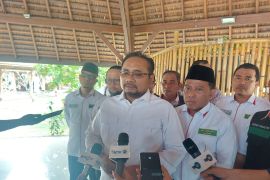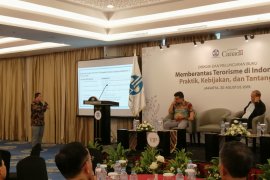PT Jasa Marga aims to finish all toll road projects that have secured concessions by 2019. Some sections, particularly those in Java, are already operational. In 2017, the company plans to operate six new toll roads, with a total length of 235 kilometers (km), in Java and Sumatra.
"The toll roads are developed to reduce traffic gridlocks on the main roads. Moreover, the number of private vehicles virtually exceed the limits," AVP Corporate Communications of PT Jasa Marga Dwimawan Heru said in Bekasi, West Java, on Sunday (Dec 18).
Road users are increasingly facing congestion but their coverage time is expected to be reduced with the construction of the turnpikes.
For this purpose, PT Jasa Marga will open six new toll road sections in 2017. Five in Java and one in Sumatra.
In Java, they are the Semarang-Solo section stretching 17.50 km, the Surabaya-Mojokerto segment with a length of 15.50 km (this is in addition to the one already in operation so that the Surabaya-Mojokerto section can be operated fully) and the Gempol-Pasuruan sector measuring 20.5 km.
The other sections that will be operated in 2017 are the Solo-Ngawi stretching 90.25 km, the Ngawi-Kertosono with a length of 49.51 km, and one in Sumatra, namely the Medan-Kualanamu-Tebing tinggi segment in Sumatra with a total length of 41.69 km.
PT Jasa Marga is committed to finish all toll road projects by 2019, in line with its concrete contribution to national economic growth by developing infrastructure and improving connectivity among regions.
The government is poised to connect its ambitious trans-Java toll roads, stretching 806 km from Cikampek in West Java to Probolinggo in East Java, by 2018.
While some sections are already operational, five sections will begin operation next year.
The other section of the trans-Java toll road is the 116.7 km Cikampek-Palimanan (Cikapali) section in West Java, which was inaugurated by President Joko Widodo (Jokowi) in June last year.
This toll road is part of the trans-Java toll road project that will connect Merak in Banten, the western tip of Java, and Banyuwangi in the eastern part of the island.
The government gives priority to sections included in the first phase construction.
The first phase construction covered nine sections stretching 615 kilometers. They are built at a cost of Rp51.41 trillion. Those sections are Cikampek-Palimanan, Pejagan-Pemalang, Pemalang-Batang, Batang-Semarang, Semarang-Solo, Solo-Ngawi, Ngawi-Kertosono, Mojokerto-Jombang-Kertosono, and Mojokerto-Surabaya.
In the meantime, in Sumatra, the government is also planning to complete at least eight toll road sections, which are part of the Trans-Sumatra toll roads, in 2019.
The eight toll roads are Medan-Binjai (17 kilometers), Palembang-Indralaya (22 kilometers), Bakauheni-Terbanggi Besar(140 kilometers), Pekanbaru-Dumai (131 kilometers), Terbanggi Besar-Pematang Panggang (100 kilometers), Pematang Panggang-Kayu Agung (85 kilometers), Palembang-Tanjung Api Api (90 kilometers), and Kisaran-Tebing Tinggi (60 kilometers), with a total length reaching 645 kilometers.
Under the presidential decree 117/2015 on acceleration of toll roads construction in Sumatra, eight toll roads would be constructed first with a target to operate the roads by the end of 2019.
The Trans-Sumatra toll roads construction has adopted a state guarantee scheme, where the government would guarantee its funding, to assure that the project could be finished as targeted.
"We call it a state guaranteed model, which will be fully backed-up by the government," Herry Trisaputra Zuna, head of toll road regulator agency (BJPT) of the Public Works Ministry, said in a discussion on Friday.
Herry said that the scheme was adopted, as the government acknowledged the importance to accelerate toll road construction projects for economic development, despite its feasibility being still inadequate.
If the toll roads were built only after being considered as feasible projects, then the land price at that time would be much higher.
Meanwhile, Soebagiono, the Public Works Ministrys director of toll roads and urban areas, said that they have accelerated land clearance process and were working on coordination with some related institutions.
The ministry has also considered the possibility of constructing elevated toll roads in densely populated areas. The land clearance process for Medan-Binjai toll roads has been completed by 83 percent, with 35 percent under construction.
Land clearance processes for Palembang-Simpang Indralaya and Bakauheni-Terbanggi Besar have reached 83 percent and 42 percent, respectively.
The target was set in the presidential decree that the (construction of) the eight toll roads would be completed in 2019.(*)
Reporter: Andi Abdussalam
Editor: Heru Purwanto
Copyright © ANTARA 2016











